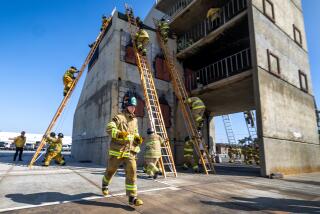California community college students choosing jobs over class likely fuel enrollment drop

California’s precipitous drop in undergraduate college enrollment — driven largely by big declines in community college attendance — has continued for a second straight year, a trend fueled by a declining population and pandemic pressures drawing young adults to the workforce, not classrooms.
California saw an overall 6.5% drop in undergraduate enrollment from fall 2020 to fall 2021, a decline that is higher than the 3.5% national average and the sixth highest in the nation after Mississippi, Alaska, Indiana, New Mexico and Delaware. When undergraduate enrollment is measured against pre-pandemic fall 2019, the California decline is 11.4%, according to the latest data collected from the National Student Clearinghouse Research Center, which compiled the higher education attendance trends.
The community college drop in California from fall 2020 to fall 2021 is 10.6%. By comparison, the national average is 6%. Graduate enrollment in the state grew slightly, by 1.8%, compared with a 2.1% uptick nationally.
Researchers had thought overall enrollment declines, nationally and in California, would show a stronger rebound when campuses reopened after pandemic-forced shutdowns upended education.
“It continues to surprise me that the undergraduate numbers have not improved this fall. For undergraduate students overall to now be an additional 3.5% lower than they were last year is really quite troubling,” National Student Clearinghouse Executive Director Doug Shapiro said. “Given where we are with the pandemic, we expected that numbers would be rebounding at this point. … An optimist would have said that we should have recovered the lost ground from last year.”
In California, the trend by spring 2021 was spiraling downward with the largest drop in college enrollment numbers across the nation. Population declines accounted for only some of the loss, researchers said.
By one measure the fall 2021 drop reflects some good news: More community college students transferred to four-year universities. But there were fewer incoming students, Shapiro said. And it is likely those who might typically go to college have opted for the job market instead.
“I think a lot of students, particularly from community colleges and online and for-profit institutions, are responding to the labor market,” Shapiro said, noting that numbers at for-profit and online institutions also dipped in the fall. “Wages have been increasing for low-wage and middle-wage jobs, and students are seeing an opportunity to try to earn back money that they might have lost during the pandemic.”
At California Community Colleges, student headcount declined from roughly 2.2 million in 2019-2020 to roughly 1.8 million in 2020-2021 — a drop of 318,800 students, or 14.8%, according to the Chancellor’s Office. That number does not include fall 2021 numbers, which have not yet been released. Additionally, the Chancellor’s office is working on an update in the system’s collection of enrollment data following challenges in accurately counting online students.
“We made a conscious decision at the outset of the pandemic to provide colleges with flexibility to quickly adopt online instructional delivery methods so we could better serve students in a time of crisis. We did not have the luxury of time to insist that data definitions and systems at 116 colleges be upgraded first. We knew data collection would be impacted, but we chose students as our first priority,” Vice Chancellor Paul Feist said.
At the Los Angeles Community College District, enrollment has dropped substantially, Chancellor Francisco Rodriguez said at a recent board of trustees meeting. “We have lost enrollment significantly this year due to a variety of factors.”
The enrollment drop at LACCD from fall 2020 to fall 2021 is 11%. That decline combined with last year’s drop accounts for a 20% drop over the past two years, Rodriguez said.
The community college district serves a population of students who have been hit hard by the pandemic in Los Angeles County — areas that experienced soaring rates of COVID-19. LACCD, as well as other community college districts throughout the state, have worked to reconnect with and recruit students who have often had to support families and take on additional jobs while juggling school throughout the pandemic.
The state’s community college enrollment system has also come under attack by an unknown number of bots — or fraudulent student activity — that could have some effect on its enrollment numbers. Shapiro said the National Student Clearinghouse has been working with individual colleges to determine whether any potentially fraudulent students made it into their enrollment data.
“We haven’t been able to confirm it yet, but we believe that a small number did, but we don’t think it was large enough to have a meaningful effect on our report,” he said.
By comparison, California State University has seen about a 2.3% drop in its undergraduate headcount from fall 2020 to fall 2021.
More to Read
Sign up for Essential California
The most important California stories and recommendations in your inbox every morning.
You may occasionally receive promotional content from the Los Angeles Times.











